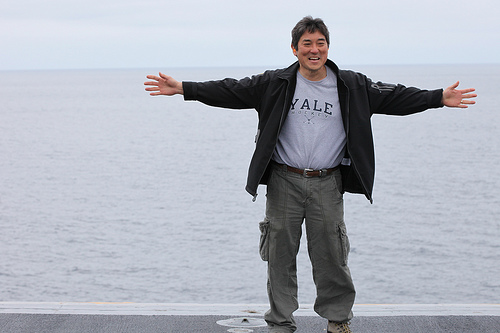This post is part two of my series on the structure of short stories. To read the first post, click here: The Structure Of Short Stories.
The Chicken And The Egg
One thing I should have said a few words about yesterday was how you can establish elements like setting (time, place, mood, and so on), who your characters are, what your protagonist's major conflict is, and all the rest of it, if you don't already have a good grasp of your story idea.
The fact is a lot of times we work our way into a short story through a bootstrapping process. Perhaps you have an initial idea--a critter with paranormal abilities, a pirate (arg!), two people who fall in love. Chances are, you'll have some an idea when you sit down what you want to do. Go with it. Brainstorm.
Here are some resources that might help generate ideas, or shape the ones you have:
Writing Prompts
Writing prompts can help defeat writer's block, but they're also great for generating ideas. There are many sites on the web with writing prompts, but here are two I like:
- Writing prompts
- CanTeach: Writing prompts
Seventh Sanctum
Seventh Sanctum has all sorts of generators. You can generate names, settings, even story ideas! The next time you're stuck for an idea, go browse.
The Essential Idea
If you don't have all the elements of your short story yet that's fine, but lets try and distill those you do have and, perhaps, get a few more along the way. You can make sure you're starting off on the right foot. (This is also a great exercise for after you've finished your story to make sure all the essentials are in place.)
Nathan Bransford has a terrific blog. The post I come back to the most is Nathan's Query Letter Mad Lib in which he gives the forumla for how to summarize your novel in one sentence. But to condense an entire story down to one sentence is challenging! I propose to first condense our story ideas into 5 sentences and then, from there, we can hone it even farther.
Sound like a plan? Great! Let's get started.
A 5 Sentence Story Description
Nathan Bransford very generously posted the query he used to shop around his first book: Jacob Wonderbar and the Cosmic Space Kapow. (Nathan used to be an agent for Curtis Brown Ltd.)
Let's dissect Nathan's description of his novel and see if we can't make a template out of it:
1. The ordinary world
"Jacob Wonderbar has been the bane of every substitute teacher at Magellan Middle School ever since his dad moved away from home."
[Protagonists name] has been [protagonists outer challenge] ever since [protagonist's wound].
2. Setting and characters introduced
"He never would have survived without his best friend Dexter, even if he is a little timid, and his cute-but-tough friend Sarah Daisy, who is chronically overscheduled."
He never would have survived without [friend1 description] [friend1 name], even if he is [friend1 fault], and his [friend2 description] [friend2 name], who is [friend2 fault].
3. Entering the special world
"But when the trio meets a mysterious man in silver one night they trade a corn dog for his sassy spaceship and blast off into the great unknown."
But when the trio meets [threshold guardian description] they [cross the threshold] and [exciting verb for "enter"] [the special world].
4. It all falls apart
"That is, until they break the universe in a giant space kapow and a nefarious space buccaneer named Mick Cracken maroons Jacob and Dexter on a tiny planet that smells like burp breath."
That is, until [the awful thing that happened as a result of protagonist's actions] and [antagonist description] named [antagonist name] does [some hideous deed to protagonist that hurts him and will definitely prevent him from reaching his external goal].
5. The challenge
"The friends have to work together to make it back to their little street where the houses look the same, even as Earth seems farther and farther away."
The [protagonist] has to work [deed] to [achieve their external goal and return to the ordinary world].
Example: The Firm
1. Ordinary world
Mitch McDeer worked hard to get top grades at Harvard Law School because he never wanted to be poor again.
2. Characters and setting
He would never have succeeded without the love and support of his beautiful wife Abby who, more than anything, wants Mitch to stop running and accept who he is, and to accept his brother, even though his family is a reminder of what Mitch is running from: the shame of growing up in a trailer park, poor, raised by a mother who didn't really care about him.
3. Entering the special world
When the lawyers from Bendini, Lambert & Locke offer Mitch more money than any other law firm it is a dream come true and he and Abby move into their brand new house, courtesy of the firm.
4. It all falls apart
Everything is great until Mitch learns about the secret files and discovers Bendini, Lambert & Locke is just a front for organized crime. As the FBI closes in on Mitch, threatening him with prison, the mob gets suspicious.
5. The challenge for the protagonist
Mitch has to rely on his wits to save himself and Abby. But is he up to the challenge?
One Sentence Summary
"A young lawyer joins a prestigous law firm only to discover that it has a sinister dark side. (The Firm, IMDB)"
Let's see if we can't expand on that summary of The Firm using Nathan's formula:
[protagonist name] is a [description of protagonist] living in [setting]. But when [complicating incident], [protagonist name] must [protagonist's quest] and [verb] [villain] in order to [protagonist's goal]. (Query Letter Mad Lib)Here's my attempt:
Mitch McDeere is a smart, motivated, young lawyer living in Boston. But when he gets a job with a group of crooked lawyers, Mitch must thread his way between the dual threats of the FBI and the mob in order to preserve both his life and his law degree.What I find interesting is that certain points had to fall by the wayside. Here we are forced to only focus on what is of primary importance for the plot: Mitch, the threat posed by the mob and the threat posed by the FBI.
Mitch's wife, Abby, was a large part of the plot, but in the one (okay TWO!) sentence summary she falls by the wayside.
Being ruthless like this and cutting away until you're left with the essential bits can help you focus, right from the beginning, on what is critical to your story. It can help make it strong and easier and quicker to write.
I think that's it for now. In the next post in this series--which probably won't be tomorrow, I'll give you folks a break!--I'll talk about Dan Well's 7-Point system.
(By the way if you haven't read Ben Guilfoy's article on how to write a serial you're missing out! I think serials are the next big thing and Ben's been writing them for years. He explains his system clearly and with humor. Truly, a must read.)
Till tomorrow, happy writing!
Other articles you might like:
- The Structure Of Short Stories- Where Ideas Come From And The Conspiracy Against Nothingness
- Roleplaying Games And Writing, Does The One Help The Other?
Photo credit: "Sunburst" by John-Morgan under Creative Commons Attribution 2.0.











